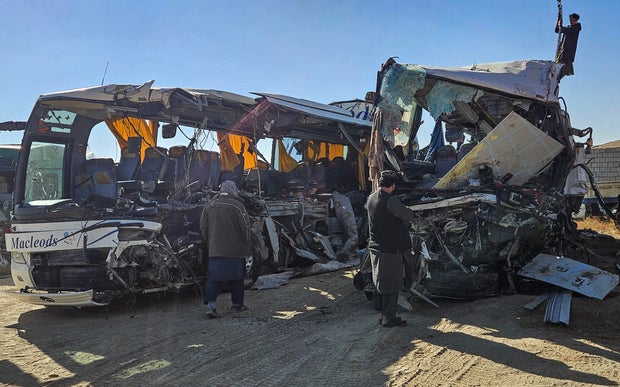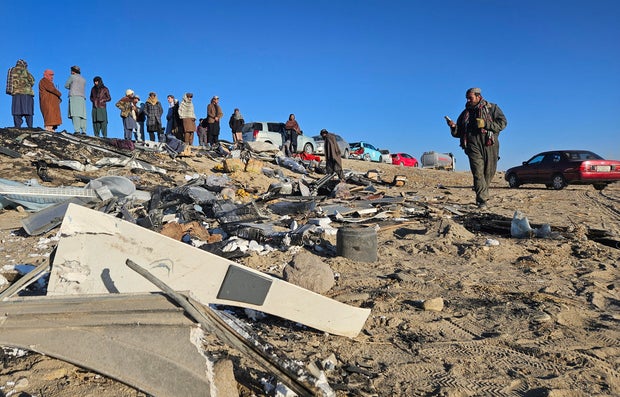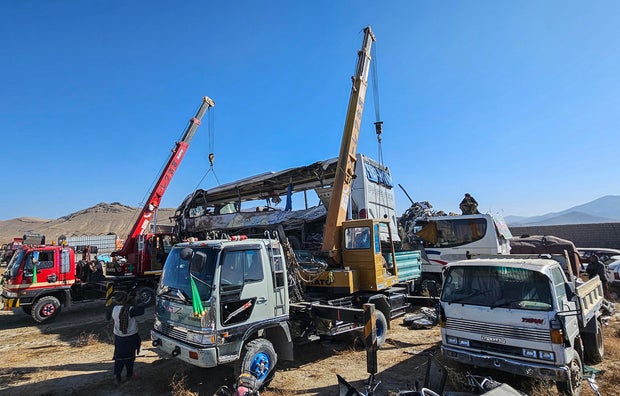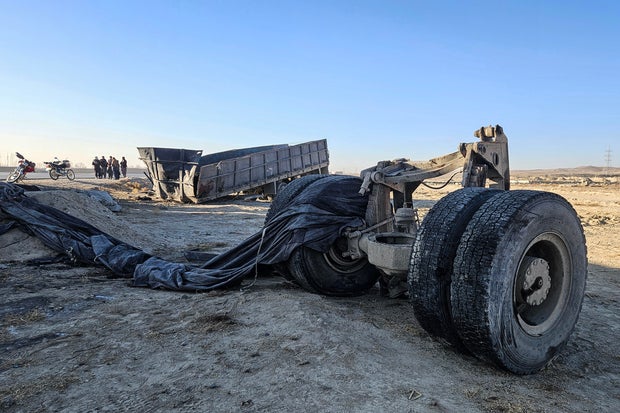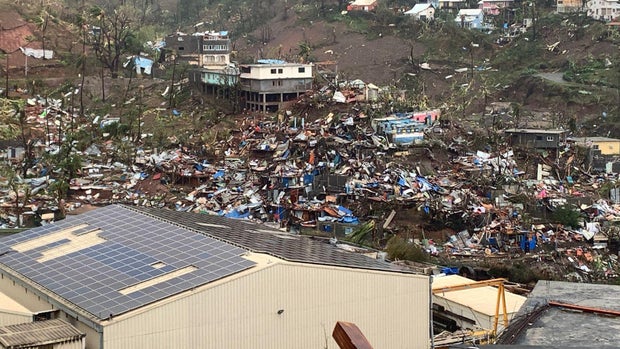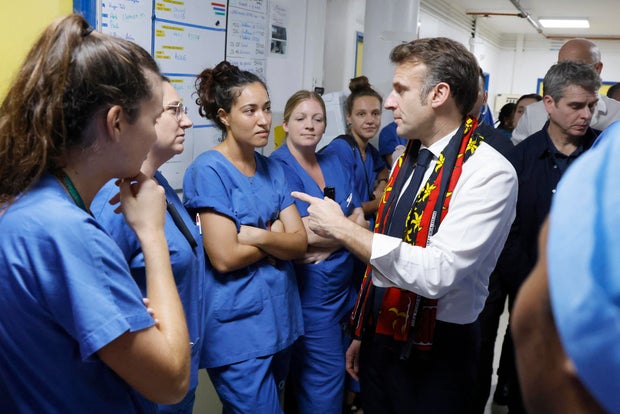CBS News
The best UV-C phone cleaners and sanitizers in 2024

Amazon
Spring cleaning season is right around the corner. While you’ve likely given some thought to cleaning your home and car, have you thought about spring cleaning your phone?
Your smartphone is one of the dirtiest and most germ infested things you touch each day. In fact, Harvard University has released research indicating that ten times more bacteria can be found on a phone screen than on a toilet seat or handle. So, even if you’re not a germaphobe, it makes sense to clean your phone at least once per day.
When you do this, however, you don’t want to use harsh chemicals. While some people use a lint-free, microfiber cleaning cloth and mild soap and water (that’s first applied to the cloth, not directly to the phone), there’s an easier way to sanitize your phone: UV-C light.
Best phone cleaners and sanitizers in 2024
Our in-house team of tech experts has curated this list of the five best UV-C light-based devices you can use to sanitize or disinfect your smartphone. While these devices can kill or remove germs, not all of them will get rid of fingerprint smudges on your phone’s screen. For this, we recommend using an inexpensive microfiber cleaning cloth.
All of the devices in this roundup will work with almost any smartphone, regardless of its make and model.
Best smartphone UV sanitizer overall: PhoneSoap 3
Amazon
The PhoneSoap 3 is a USB-powered UV-C phone sanitizer that comes in seven outside casing colors. When you place your mobile device inside and turn on the PhoneSoap 3, it will kill 99.9% of germs. While your phone is being sanitized, it can remain powered on, so you’ll hear any incoming calls, alerts or notifications.
Once you place your smartphone inside the PhoneSoap 3, the cleaner’s design allows UV-C light to reach all sides and outer areas of your phone. It can be used on any phone — with or without a case. The PhoneSoap 3 also works to sanitize other small objects. Once turned on, the sanitization process takes about 10 minutes.
The unit itself measures 8.5 x 5 x 1.75 inches. The sanitizing bay, however, measures 6.8 x 3.74 x 0.78 inches. The PhoneSoap 3 relies on two 10.5cm UV-C light tubes. It comes with a power adapter.
Best phone UV sanitizer and charger combo: PhoneSoap Pro
Amazon
The PhoneSoap Pro is an enhanced version of the PhoneSoap 3. While it costs a bit more, it also sanitizes your phone (or whatever items you place inside) in about half the time — about five minutes. You also get a slightly larger disinfection bay.
This version of the PhoneSoap comes in six colors. It measures 9.63 x 5.38 x 2 inches, while the inside sanitizing bay measures 7.1 x 4.38 x 0.72 inches. It too is powered via its USB charging port and comes with a power adapter.
Instead of using just two UV-C light tubes, this device takes advantage of four light tubes that work simultaneously.
Best UV sanitizer for phones and tablets: HomeSoap Large Capacity
Amazon
Since so many of us rely on our phones, tablet and smartwatch, as well as other smaller-sized consumer tech gadgets (such as wireless earbuds, TV remote control devices or handheld gaming systems), the HomeSoap Large Capacity is able to accommodate a larger range of items due to its larger size.
If you have an infant, the same device can be used to sanitize small toys, baby bottles and pacifiers. Like the other PhoneSoap models, this larger capacity unit is designed to completely encompass whatever items you’re sanitizing in UV-C light.
The HomeSoap Large Capacity comes in either black or white. Each disinfection cycles takes approximately 10 minutes to complete. The unit has a built in USB Type-A and USB Type-C port that can be used to recharge your mobile device while it’s being sanitized.
The unit itself measures 14.9 x 5.96 x 11.15 inches. The sanitizing bay (in which you place your items) measures 13.18 x 3.66 x 9.24 inches. This is 27x more space than the PhoneSoap 3. While the HomeSoap Large Capacity may fit multiple items at the same time, to ensure complete light coverage during the sanitizing process, we recommend using it with just one item at a time.
Best cordless UV phone sanitizer: Lexon Oblio
Amazon
The design of the Lexon Oblio looks like a large cup that you place your phone in to be sanitized. One feature we like about this UV-C sanitizing device is that it has a built in Qi-certified wireless charging pad, so you can recharge your phone and sanitize it using the same device. From a size standpoint, it accommodate just about any smartphone.
The disinfection cycle takes about 20 minutes. Recharging the phone’s battery, however, could take up to three hours. When you place your phone into the Lexon Oblio, an LED indicator light will illuminate to inform you it’s been placed properly. It then alert you when the sanitization process and recharging process is completed.
The Lexon Oblio comes in three colors: black, dark blue and gold. It measures 6.8 x 2.76 x 2.76 inches and must be plugged into a standard power outlet (using the supplied adapter) to function.
Best UV sanitizer for all tech: Lumin 3B Medical Multi-Purpose UV-C Cleaner
Amazon
The Lumin 3B Medical Multi-Purpose UV-C Cleaner was originally designed to sanitize CPAP machine equipment, like tubing and face massk. However, thanks to its rather large sanitizing chamber, it can accommodate a wide range of other objects, including any smartphone. It can also work with most tablets, headphones, wireless earbuds, handheld gaming consoles, baby-related products and personal items (like your wallet, eyeglasses, jewelry and keys).
The unit itself can be kept on a dresser, desk or countertop. To function, it must be plugged into a power outlet. The inside chamber measures 9.38 x 6.38 x 3.88 inches. Each sanitization cycle takes just five minutes to complete. We particularly like the Lumin 3B because it’s very simple to use. Just plug it in, insert whatever you want sanitized, close the drawer and press the Power button. The Lumin 3B handles the rest.
Yes, this 4.4-star-rated UV-C sanitization unit is more expensive than the others featured in this roundup, but has a significantly larger capacity and it works faster.
What is UV-C light and how does it sanitize?
UV-C is a form of ultraviolet light that has a short wavelength (between 100 and 400 nanometers). It’s highly affective at killing microbes or rendering them inactive. UV-C light is clinically proven to work well against bacteria, viruses and similar pathogens. UV-C light has been used as a sanitization method since the mid-20th century.
All of the devices featured in this roundup are designed for use with smartphones and tablets, but in reality, they can be used to sanitize any items that will fit within the sanitization chamber. This includes items like your keys, wallet, eyeglasses or jewelry. Of course, what fits within the UV sanitizing device will depend on its size and shape.
Is UV-C light sanitization safe?
UV-C light is a chemical-free germicidal.
There’s a reason why most phone cleaning devices are fully enclosed. UV-C lighting can be harmful to your eyes and skin, so any direct contact should be avoided. For your own safety, place your phone or mobile device into one of these UV-C sanitizers, turn it on and then walk away until its sanitizing process is complete. Be sure to follow the directions provided by the product’s manufacturer.
After using one of these UV-C sanitization devices on your items, you may notice a residual smell. It will dissipate quickly. Try to avoid breathing it in. After your item (such as your phone) has been sanitized, it’s best to wait a few minutes before using it or placing it near your face.
CBS News
FAA bans drones over several New Jersey towns. See the list.

NEW YORK — Drones have been banned from flying over several New Jersey towns, the Federal Aviation Administration confirms to CBS News.
The FAA order covers nearly two dozen towns, including Jersey City, Harrison, Edison, Bayonne and Camden. It will be in effect until Jan. 17.
The order says no unmanned aircraft can operate below 400 feet within one nautical mile of the airspace specified in each area. Additionally, it allows the government to use “deadly force” against the drones if they pose an “imminent security threat.”
“Pilots of aircraft that do not adhere to the procedures in the national security requirements for aircraft operations contained in this section may be intercepted, and/or detained and interviewed by federal, state, or local law enforcement or other government personnel,” the order reads in part.
Several of the zones are centered around infrastructure, like power substations. Others cover areas like the Kearny, New Jersey port and airspace around military installations like Joint Base McGuire-Dix-Lakehurst in South Jersey, or airports such as Newark-Liberty International Airport.
Earlier this month, the Florham Park, New Jersey police chief told residents drone sightings had been reported above “water reservoirs, electric transmission lines, rail stations, police departments, and military installations.”
Where are drones banned in New Jersey?
North Jersey:
- Cedar Grove
- Bridgewater
- North Brunswick
- Metuchen
- South Brunswick
- Edison
- Branchburg
- Sewaren
- Jersey City
- Harrison, Essex County
- Elizabeth
- Bayonne
- Clifton
- Kearny
Central Jersey:
South Jersey:
- Burlington
- Evesham
- Camden
- Gloucester City
- Westampton
- Winslow
- Hancocks Bridge, Salem County
See the full order from the FAA here.
Mysterious drones over New Jersey and beyond
Drones sightings have been reported all month long, first over Morris County, New Jersey and then over several other East Coast states.
Federal, state and local officials have been demanding more information about where they are coming from and what’s being done to stop them. The FBI is leading the investigation and tells CBS News it has received thousands of tips.
While the White House says there is no known threat, New Jersey Gov. Phil Murphy recently sent a letter to President Joe Biden asking for more federal resources.
On Wednesday, a push from Sen. Chuck Schumer to give local law enforcement more ways to track drones was blocked in the Senate.
Check back soon for the latest updates on this developing story.
contributed to this report.
CBS News
2 bus crashes in Afghanistan leave dozens dead, dozens more hurt

Two highway crashes in southeastern Afghanistan killed a combined total of 50 people and injured 76, a government spokesman said Thursday.
One was a collision between a bus and an oil tanker on the Kabul-Kandahar highway late Wednesday, said Hafiz Omar, a spokesman for the governor of Ghazni province.
The other, also late Wednesday and in the same province, was in a different area of the same highway, which connects the Afghan capital with the south.
MOHAMMAD FAISAL NAWEED / AFP via Getty Images
Hamidullah Nisar, the provincial head of the Taliban-run Information and Culture Department, told the Reuters news agency the other accident involved a cargo truck, adding that some of those injured in both collisions were in critical condition.
Omar said many of the injured were taken to hospitals in Ghazni and patients in more serious condition were transferred to Kabul. Women and children were among the casualties, he said.
Authorities were in the process of handing over the bodies to families, Omar said.
MOHAMMAD FAISAL NAWEED / AFP via Getty Images
Crash survivor Abdullah Khan, who was being treated in a Ghazni hospital, said he didn’t know how many people had either died or were injured.
“I got out from the bus myself and heard the sound of moaning. There was blood everywhere. Some people had head injuries and others had hurt their legs.”
MOHAMMAD FAISAL NAWEED / AFP via Getty Images
Traffic accidents are common in Afghanistan, mainly due to poor road conditions and driver carelessness.
MOHAMMAD FAISAL NAWEED / AFP via Getty Images
CBS News
France’s President Emmanuel Macron tours cyclone-battered Mayotte, meets survivors pleading for help

Mamoudzou, Mayotte — France’s President Emmanuel Macron traveled Thursday to the Indian Ocean archipelago of Mayotte to survey the devastation that Cyclone Chido wrought across the French territory as thousands of people tried to cope without bare essentials such as water or electricity.
“Mayotte is demolished,” an airport security agent told Macron as soon as he stepped off the plane.
The security agent, Assane Haloi, said her family members, including small children, are without water or electricity and have nowhere to go after the strongest cyclone in nearly a century ripped through the French territory of Mayotte off the coast of Africa on Saturday.
KWEZI/AFP/Getty
“There’s no roof, there’s nothing. No water, no food, no electricity. We can’t even shelter, we are all wet with our children covering ourselves with whatever we have so that we can sleep,” she said, asking for emergency aid.
Macron got a helicopter tour of the damage and was to spend Thursday night on the far-flung French territory. After flying over the destruction, he headed to the hospital in Mamoudzou, Mayotte’s capital, to meet medical staff and patients.
Wearing a traditional Mayotte scarf on his white shirt and tie, sleeves rolled to the elbows, the French president listened to people asking for help. A member of the medical staff told him some people hadn’t had a drink of water for 48 hours.
Some residents also expressed agony at not knowing about those who have died or are still missing, partly because of the Muslim practice of burying the dead within 24 hours.
LUDOVIC MARIN/POOL/AFP/Getty
“We’re dealing with open-air mass graves,” Mayotte lawmaker Estelle Youssoufa told reporters. “There are no rescuers, no one has come to recover the buried bodies.”
Some survivors and aid groups have described hasty burials and the stench of bodies.
Macron acknowledged that many who died hadn’t been reported. He said phone services will be repaired “in the coming days” so that people can report their missing loved ones.
French authorities have said at least 31 people died and more than 1,500 people were injured, more than 200 critically. But it’s feared hundreds or even thousands of people have died in total.
Abdou Houmadou, 27, said emergency aid was needed immediately, not Macron’s presence.
“Mr. President, what I’d like to tell you… is I think the spending you made from Paris to Mayotte would have been better spent to help the people,” he said.
Another resident, Ahamadi Mohammed, said Macron’s visit “is a good thing because he’ll be able to see by himself the damage.”
“I think that we’ll then get significant aid to try and get the island back on its feet,” the 58-year-old said.
LUDOVIC MARIN/POOL/AFP/Getty
Macron’s office said four tons of food and medical aid, as well as additional rescuers, were aboard the president’s flight. A navy ship was due to arrive in Mayotte on Thursday with another 180 tons of aid and equipment, according to the French military.
People living in a large slum on the outskirts of Mamoudzou were some of the hardest hit by the cyclone. Many lost their houses, some lost friends.
Nassirou Hamidouni sheltered in his house when the cyclone hit.
His neighbor was killed when his house collapsed on him and his six children. Hamidouni and others dug through the rubble to reach them.
The 28-year-old father of five is now trying to rebuild his own house, which was also destroyed.
He believes the death toll is much higher than what’s officially being reported, given the severity of what he lived through.
“It was very hard,” he said.
Mayotte, located in the Indian Ocean between mainland Africa’s east coast and northern Madagascar, is France’s poorest territory.
The cyclone devastated entire neighborhoods and many people ignored the warnings, thinking the storm wouldn’t be so extreme.
Mayotte has more than 320,000 residents according to the French government. Most are Muslim and French authorities have estimated another 100,000 migrants live there.
Mayotte is the only part of the Comoros archipelago that voted to remain a part of France in a 1974 referendum.
Over the last decade, the French territory has seen a massive influx of migrants from the neighboring islands – the independent nation of Comoros, which is one of the world’s poorest countries.








